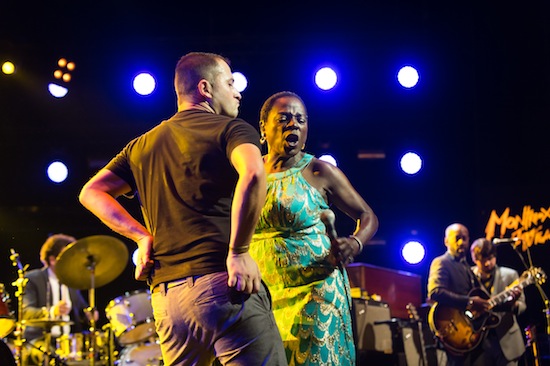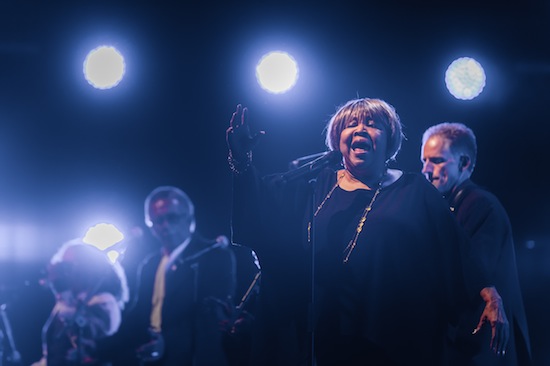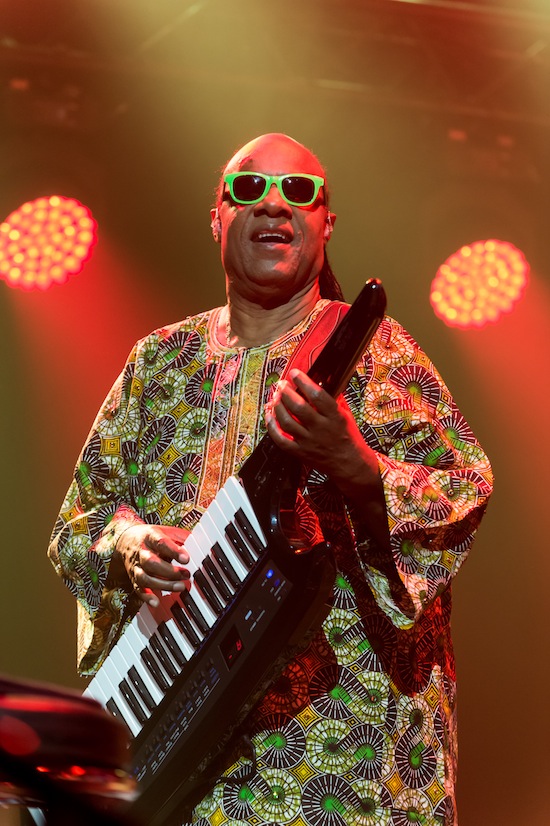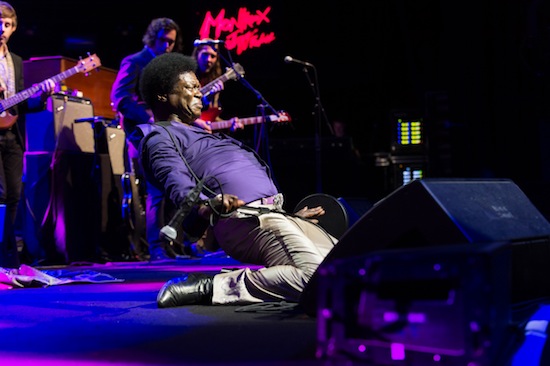"We all came out to Montreux…"
Founded as a jazz festival in 1967, Montreux quickly expanded its remit to soul, blues, rock and world music. While the festival has always had its leftfield elements – legendary Sun Ra and Miles Davis sets in the 70s, Sonic Youth in 2000 – it tends to be fairly mainstream and classicist in its programming. Yet for every Jamie Cullum or Chris Rea there’s an OutKast or Mulatu Astatke. One beauty of Montreux is that it presents superstar acts in what for them is virtually a club. Where else could you see Stevie Wonder in a 4,000-seat venue? And with such good sound? Besides the paying gigs indoors, the park and lakefront surrounding the arena host free shows (youth orchestras during the day, the world’s funkiest saxophone player Maceo Parker at night), exhibitions and numerous food and drink stalls. By night, the Rock Cave presents free indie and rock gigs (Toy, Lords Of Altamont), while the Jazz Lab becomes a club space commandeered by the likes of Ellen Allien, Nina Kraviz and Green Velvet. The atmosphere is laid-back and friendly, and while things get livelier at night, it’s rather more civilised than the carnage of a UK festival. The setting is beautiful. To quote Mary Shelley, the waters of Lake Geneva, or Lac Leman as it’s known locally, remain, ‘as blue as the heavens which it reflects’. Reaching up those heavens are the Alps, their craggy snow-topped peaks offering a glimpse of the romantic sublime. It’s easy to see why many a rock star, from Lord Byron to Freddie Mercury, has been attracted to the Swiss town. Deep Purple famously came to record in Montreux in 1971, only to have their plans scuppered after "some stupid with a flare gun" burned down the Casino during Frank Zappa’s set, hence ‘Smoke On The Water’. Festival founder Claude Nobs, who sadly passed away last year, is immortalised in the song as "Funky Claude". It’s to his memory that many of the acts dedicate their sets this year.
Don’t let the trumpet player upstage you
On he struts, resplendent in a lilac suit, wielding an elaborately-wrought gold cane. Dr John may have placed a skull on top of his piano, but the eerie voodoo sounds of his 1968 masterpiece Gris Gris are absent tonight. This is his tribute to Louis Armstrong; one New Orleans legend paying homage to another. The set draws mainly on standards Satchmo made his own like ‘Nobody Knows The Trouble I’ve Seen’ and ‘When You’re Smiling’, only occasionally dipping into the radical jazz of the Hot Fives and Hot Sevens. ‘What A Wonderful World’ is ill-suited to its good-time R&B treatment. A Nite Tripper-style ‘Mack The Knife’ could have been deliciously sinister, dragging Kurt Weill through a steaming swamp, but the version Dr John plays tonight sounds like a show tune trying to be funky. The horn section, led by trombonist Sarah Morrow, are highly accomplished, but it’s only really guest trumpeter Nicholas Payton who summons the spirit of Satchmo. The self-styled purveyor of post-modern New Orleans music, Payton channels all of jazz history into gleaming solos of wit and invention.
Sharon Jones is a star
Given the ceaseless innovations in R&B since the 1970s, the retro soul of the Daptone label might seem about as relevant today as trad jazz. But such quibbles are quickly swept away by the sheer energy and showmanship of the Daptone Super Soul Revue. This isn’t some dry exercise in revivalism, but a smart synthesis of southern soul and James Brown funk, with Charles Bradley’s Extraordinaires adding some psychedelic touches and Antibalas bringing the Afrobeat.
A proper old school soul revue is quite an experience: over two hours of almost non-stop music, with guitarist and MC Binky Griptite introducing a revolving cast of musicians and singers. The Dapettes, aka Saun and Starr, kick things off with the shimmying ‘Hot Shot’, followed by the Sugarman 3’s groovy horn-led instrumentals. But it’s with the entrance of Charles Bradley, a glorious vision in a silver suit embroidered with a sequinned skull, that the show really takes off. His arms out wide like a bird of prey, the "Screaming Eagle of Soul" glides on stage and launches straight into his vintage soul stirrers. That nickname is well-earned, as Bradley unleashes his repertoire of impassioned wails, grunts and shrieks. While James Brown is an obvious influence on his vocals and dance moves, there’s a more than a touch of Otis Redding in the way he handles the ballads. "I got the looooove," he insists on ‘Strictly Reserved For You’, wringing every last drop of heartache from his soul. ‘Let Love Stand A Chance’ is an epic slow jam, with Bradley entering into a lover man monologue about the difference between love (hand on heart) and lust (hand on crotch). Breaking it down, he muses, "Love is… love is… when you come home a little early… Making up… mmm… making up is the best part!" Such routines are faintly ridiculous, but they’re done with such sincerity and panache that they hit the spot every time.
Antibalas take over for an exceedingly danceable set of jittery Afrobeat, followed by the return of the Dap-Kings, led by the fabulous Sharon Jones. Running on stage screaming, she pulls a punter from the crowd for some lascivious gyrations. For ‘Get Up And Get Out’, she gives us her best Tina Turner impression, standing with her legs apart, shaking her head and building the groove up from slow burn to blazing funk. There’s a remarkably moving and funny sequence where she testifies to her cancer treatment in ecstatic Pentecostal style: "I was laying in bed… lost all my curls… I said Sharon… I said Sharon…you’re gonna make it." James Brown’s ‘There Was A Time’ is a vehicle for a dance off between Jones and Bradley. They do the Camel Walk, the Mashed Potato, the Funky Chicken: fantastic entertainment. Defying his 65 years, Bradley breaks into some fancy James Brown footwork, before ending on a spectacular knee-drop split. For the encore, the entire Daptone clan take the stage for a horn-blasting medley of Sly Stone’s ‘Family Affair’ and Sister Sledge’s ‘We Are Family’, a touching end to a collective offering of joy and love.

How the rock aristocracy live
On my second day, I’m invited to visit Claude Nobs’ chalet complex in the hills high above Montreux. As we ascend a winding road into the Alps, I feel like I’m entering an alternate universe. Upon entering the picture postcard wooden cottage I’m struck by the beautiful mint green Vespa scooter in the vestibule. As my girlfriend later comments, you know you’ve made it when you have vehicles indoors. It’s immediately apparent how much of a music lover and collector Funky Claude was. His two commodious chalets are filled with gorgeous vintage jukeboxes filled with blues and soul nuggets, rare concert posters, and all manner of pop memorabilia. If you’re going to be a music biz millionaire, this is the way to do it. Fine wine and absinthe flow and before long, I’m wandering around the chalet, perusing Nobs’ rock & roll knick-knacks while the green fairy dances around my head. What follows may read like a wormwood-induced hallucination, but I know what I saw. Like a scene from a nostalgic movie, someone drops Stevie Wonder’s ’60s gem ‘I’m Wondering’ on a Wurlitzer jukebox, those sweet Motown strings lifting me higher. I notice a mint vinyl copy of Deep Purple’s Machine Head lying on the pool table, a nod to ‘Smoke On The Water’. Atop a grand piano sits a photo of Nobs with Paul McCartney, Jeff Lynne and Joe Walsh of The Eagles. There are musical instruments everywhere, all set up so visiting musicians can break into an impromptu jam. Stepping outside, the views are spectacular, taking in the vista of Lac Leman and the snow-topped Alps. The garden furniture is delightfully eccentric: giant toadstools, a multicoloured elephant with a saxophone for trunk. Next to a picturesque water-wheel sits a giant gong. I have visions of some drunken rock star running out naked in the snow to pound at the metal disc, letting its crashing tones ring out across the valley. At which point I decide it’s probably best to drink some strong coffee and return to civilisation.
And It Bored Me: Van Morrison gets tasteful
Having heard good things about his Green Man headline set a couple of years back (all your favourites from Astral Weeks and Moondance) I was quietly hopeful for Van Morrison’s return to Montreux. What we got was a highly professional set of laid-back R&B – in other words, a bit of a snoozefest. I’d been intrigued by the news that Morrison has been opening many of his recent shows with ‘Celtic Swing’, a saxophone instrumental from his 1983 album Inarticulate Speech Of The Heart. With its fusion of New Age synth and Celtic jazz, it’s a record ripe for rediscovery by hypnagogic pop fetishists. Shorn of its 80s avant-M.O.R. production, ‘Celtic Swing’ sounds more traditional, all velvety Hammond chords and Irish mystic alto sax. Morrison isn’t a bad saxophonist, but his phrasing is pretty unadventurous, alternating between soft trills and staccato blues figures. The same might be said of his singing. His grace notes and ad libs are competent enough, but they hardly reach the ecstatic heights of Astral Weeks. His scatting is uninspired, revolving around repeated intensifiers ("very, very, very, very, very") and predictable syncopations. In fairness, his voice itself is in good shape, mellowed with age, but not without a flinty edge. The horn section, which tonight includes special guest Maceo Parker, take some classy solos, but there’s little tension generated between the band as a whole. With their easy rhythms and tight horn arrangements, latter day cuts like ‘Back On Top’ and ‘Open The Door (To Your Heart)’ are perfectly pleasant, but I can’t help but wish for someone to cut across the grain with a brief squall of sax or an off-kilter rhythm. ‘Ballerina’, that glorious song from Astral Weeks, makes a very welcome appearance towards the end, but as gorgeous as it sounds, it is perhaps a little too neat, lacking the sublime sense of chaos jazzers Connie Kay and Richard Davis brought to the original. Morrison closes the set by paying homage to one of his blues masters, Sonny Boy Williamson, yet there’s no grit to his version of ‘Help Me’, the original’s steam engine riff rendered as a tasteful shuffle.
"When you moan, the devil don’t know what you’re talking about."
In contrast to Morrison’s nine-piece band, Mavis Staples has just guitar, bass, drums and a trio of backing singers. Yet they generate far more noise, energy and soul than the Belfast Cowboy’s slick posse. Led by guitar ace Rick Holmstrom, her band cook up a raw, bluesy take on the early Staple Singers’ sound, all tough tremolo guitar and funky gutbucket drums, leaving plenty of space for the singers to work their gospel magic. They might not go in for the mildly experimental indie rock touches Wilco’s Jeff Tweedy brought to Staples’ last two albums, but this is a dynamic band, unafraid of silence or dissonance. Staples dips into those recent albums tonight – ‘I Like The Things About Me’ is particularly tasty – but much of the set draws on Staple Singers classics alongside some smart covers.
Several songs revisit the Civil Rights era, including a stirring ‘Freedom Highway’, written by Roebuck Staples for the 1962 Selma to Montgomery March, and Martin Luther King’s favourite, ‘Why Am I Treated So Bad’. Closing the main set, Little Milton’s 1965 hit ‘We’re Gonna Make It’ becomes a righteous gospel rave-up, with ecstatic vocals and strident guitar. It’s not all back-in-the-day though: her version of Lauryn Hill’s ‘Everything Is Everything’ works brilliantly, the original’s staccato strings transformed into a jagged guitar riff oddly reminiscent of Amerie’s ‘One Thing’. It’s also a great showcase for Staples’ inspired vocal interplay with Donny Gerrard, Vicki Randle and Yvonne Staples.

At 75, Staples’ voice is deep and husky, sweet like molasses. Between songs, she finds herself moaning melodically. "I like to moan y’all," she says, "My grandmother liked to moan… I knew it had something to do with music. ‘Grandma why do you moan like this all the time?’ ‘Well, when you moan, the devil don’t know what you’re talking about.’" That delicious tension between the sacred and the profane animates the set. Penned for the Staple Singers by Curtis Mayfield, ‘Let’s Do It Again’ is gorgeously carnal, with Staples delivering lines such as, "I’m not a girl to linger, but I feel like a butterfingers" with deep relish. Gerrard takes the second verse, his smooth tenor a romantic contrast to Randle and Yvonne Staples’ delectable growls and wails.
Stevie Wonder loves you
That Stevie Wonder’s music is full of love should be no surprise to anyone, but it’s wonderful to hear it affirmed in a live setting. Following an introduction by Quincy Jones (yes, the Quincy Jones), Wonder takes to the stage jamming out a funky keytar riff. Then it’s straight into Marvin Gaye’s ‘How Sweet It Is (To Be Loved By You)’; a giddy Motown kiss. Wonder’s voice has grown slightly deeper with age, yet he’s still more than capable of hitting the high notes.

While this two-hour set is not without its indulgences or cheesy detours, Wonder finds a nice balance between blasting out the hits and remaining true to his playful spirit. The first half has a smattering of less obvious classics from Innervisions and Talking Book. There’s the rolling funk of ‘Higher Ground’, Wonder’s envelope-filtered Clavinet squelching and snapping like hot sticky toffee, and the woozy ‘You’ve Got It Bad Girl’: both magical. One of Stevie’s new toys is a kind of flat guitar neck, on which he taps out a bluesy jam which morphs into The Beatles’ ‘Day Tripper’. Hearing Stevie kick in the overdrive is a buzz, but at around ten minutes, this funk-rock workout, complete with audience participation segments, perhaps overstays its welcome. No grudges can be held, however, when he follows it up with the likes of ‘Master Blaster (Jammin)’ and ‘Don’t You Worry ‘Bout A Thing’. I’ve always found the 80s piano ballad ‘Overjoyed’ a little on the schmaltzy side, but there’s no doubt it’s a vocal tour de force, with Wonder scaling passionate heights.
Now for the bad news: yes, he plays ‘I Just Called To Say I Love You’ and, sure, it’s a bit naff, but there’s something endearingly goofy about its cornball harmonies and cruise ship rhythms. Far worse is ‘Ebony & Ivory’, that well-meaning, but hopelessly banal paean to racial harmony. It’s interesting that the song was written as a duet with Paul McCartney. Like Sir Thumbs Aloft, Wonder is a visionary pop genius with a golden gift for melody and sonic innovation. Yet like Macca, he’s also capable of descents into schlock, although in fairness, the Fab One’s rap sheet is far longer on that count.
Happily, this is but a whiffy interlude in what is a largely wondrous set. From Songs In The Key Of Life we get the glorious ‘Sir Duke’, its spiralling horn riff parroted by a breathless audience, a delirious ‘I Wish’ and a stunning gospel-tinged ‘As’. That Innervisions masterpiece, ‘Living For The City’ remains incredibly powerful, its tale of racism and police brutality sadly all too relevant. Last up, it’s ‘Superstition’, its driving funk bringing the dancefloor to life. Wonder love: you can feel it over.


